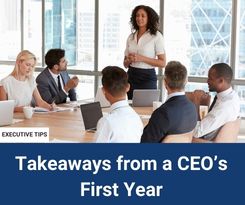
8 Takeaways from an Association CEO’s First Year
In the 10 Tips for Success for Incoming Association CEOs and Executive Directors (EDs) blog post, healthcare association executives from AMC shared their best advice for senior leaders new to an association. And while it’s important to start off on the right foot, the lessons learned as an incoming CEO/ED continue beyond those first days in office.
Reflecting on their early months as CEOs and EDs, four AMC senior executives share the key takeaways and leadership lessons that still resonate today.
Don’t let false urgency set the priority.
Instead, build a culture where you and your team understand the difference between what is a true crisis, what is urgent, and what is not.
“Be intentional about encouraging your team to pause and assess before reacting can protect their time and attention, resources which are often in limited supply,” says Wendy-Jo Toyama, CEO of the American Academy of Hospice and Palliative Medicine (AAHPM). “Creating space to research and think through a plan forward will help you give better service to your board and members, while also guarding against staff burnout.”
Be decisive and don’t second guess.
One of the most difficult aspects of the CEO/ED role is having to be comfortable making timely, mission critical decisions without as much insight as you’d prefer. In those situations, seek counsel from your circle when you can, trust your instincts, make the decision, and keep moving forward.
Follow through with what you say you’re going to do.
Success as any leader begins and ends with trust. You’ll build trust quickly with your board, staff, and members if you do what you say you’re going to do. Fail to follow through and you’ll weaken those bonds, damaging your credibility.
Understand the board as a whole but also the perspectives of the individuals.
While members of the board may govern together as a whole, each individual member brings valuable perspectives and insights unique to their own experiences. For the board to thrive, it’s important to recognize and build rapport with each member as an individual.
“Effective and high-performing boards are a diverse representation of the organization’s membership,” says Nicole Wallace, executive director of the Renewable Natural Resources Foundation (RNRF). “The CEO/ED needs to understand not only each board member’s viewpoint but also how they process information to ensure the organization’s strategic priorities move forward.”
Don’t underestimate the importance of between meeting communication with board members.
Find the balance between keeping the board over-informed and under-informed, and know that balance differs within each organization.
“Keep in mind that board members have full-time jobs outside of their roles on the board,” says Bruce Hammond, executive director of the American College of Academic Addiction Medicine (ACAAM), American Board of Addiction Medicine (ABAM) and the Hospice Medical Director Certification Board (HMDCB). “They may not have time to focus on the organization every day and consequently aren’t aware of everything that’s being done. It’s important to keep them in the loop in a systematic way.”
Respect the relationship your predecessor had with the board and staff.
Don’t underestimate the relationships your predecessor built or undermine the decisions they made. Instead, leverage what your predecessor built and develop a relationship with them to quickly gain credibility.
Don’t be an island.
Delegation is key, especially when progressing into a senior leadership role with responsibility for an entire organization.
“Before moving into an executive director role, I had 8 years of marketing and membership as my daily focus,” says Molly Anderson, interim executive director of the National Association of Neonatal Nurses (NANN). “Learning to delegate more effectively and empower other team members with my former responsibilities has allowed me the time and space to focus on my new duties and strengthen my executive skillset.”
Keep these words in mind when you feel challenged.
“Board members who in the beginning may have been skeptical because of your lack of experience in their specific field will likely become supporters of you as the months go by,” says Bruce Hammond. “Trust that your abilities and those of your staff will make a positive impact on the organization.”
Be the first to know about the latest articles, news, and events from AMC. Sign up for our emails!
Katherine Wayne is senior manager of corporate communications at AMC.


